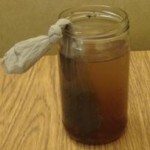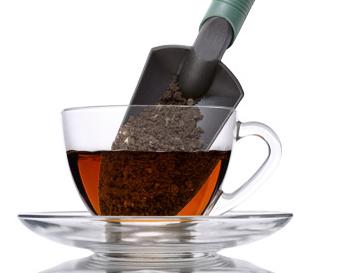Compost tea is a liquid version of compost that uses water to extract nutrients from the compost. It can be easily made at home and not only is beneficial to plant growth, but has also can be effective in suppressing some fungal diseases when applied directly to foliage.
“The juices of compost can be the best part. Often, some of the valuable nutrients in compost are dissolved in water quite readily and, in solution, these nutrients can be quickly distributed to needy plant roots. Since plants take up nutrients along with water, the use of compost tea makes quite a bit of sense, particularly during dry periods when plants are starved for both food and water” (Rodale Book of Composting).
Compost tea is especially effective suppressing fungal diseases on turf, evergreens, and fine foliage shrubs. It reintroduces antagonistic microbes that destroy fungus and parasites. Research has also shown that it can reduce mould and mildew growth on plants such as grapes, cucumbers, beans and strawberries.
All in all, Compost Tea is a very rich natural fertilizer that eliminates the need for harmful chemical products. It is absorbed quickly and easily by plants and doesn’t runoff with the next rain storm polluting our lakes and streams.
How to Make Compost Tea
Compost tea is made by steeping finished compost in water. There are a couple of different methods for making compost tea and we would suggest that you try out the easy method first and then if you are so inclined, try the aeration method and see whether the end product is worth the extra time and effort. In other words, do whatever works best for you.
Ratio of Compost to Water
Generally the recommended ratio for making compost tea is 1 part compost to 10 parts water. If however you are using the much more highly concentrated Vermicompost, the concentration should be adjust accordingly to approximately 1 part compost to 100 parts water.
Simple Method
You need:
- Bucket or can (sized appropriately)
- Old sock (No big holes!)
- Coat hanger , wire, or string
Method:
- Fill the sock with loose compost and knot the open end.
- Suspend the sock using wire or string into the container filled with lukewarm water.
- You can add the compost directly to the water, however you will need to strain it afterwards (See aeration method below)
- Let the mixture steep for 7-10 days until it is medium brown in color.
Note: If you are using vermicompost overnight steeping is sufficient.
The Aeration Method
You need:
- Five gallon containers
- Aerator pump with a “gang valve” and some aquarium hose
- Cheesecloth
Method:
- Add compost to the water filled container and stir well.
- Hang gang valve on the edge of bucket.
- Connect 2 to 3 pieces of aquarium hose to the gang valve and submerge the hoses into the compost/water mixture. (Tie a weight to the hose if needed)
- Connect the aerator pump to the gang valve with another pieces of aquarium hose.
- Activate the pump and let mixture brew for 2-3 days. (Stir occasionally as well)
- You can apply the mixture directly to soil and around plants or strain the brew using the cheesecloth for spraying or watering.
Would you like to watch a video?
Brewing and Usage Tips
Here are a few other tips for making and using your compost tea:
- Once finished, compost tea should be used as soon as possible
- Prepare only enough compost tea for immediate use.
- Store excess tea in a cool dark place.
- If you have a rain barrel, use rain water instead of tap water.
- Compost can be used several times for tea.
- There will still be some nutrients in the used compost so you can return the used compost to your pile of use it in your garden.
- If the tea seems too strong, add water – too weak, steep a little longer!
- Tea should only be used every 10-14 days at the most!
- Stronger teas work best in heavy clay soils, weaker teas in sandy soils.
There are no rules on making the perfect compost tea! Experiment with concentration, brewing time and temperature and let us know what worked best for you. Good luck with your brewing!




Recent Comments